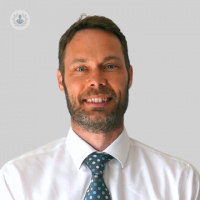What to expect with rotator cuff surgery
Autore:Rotator cuff tears are a common source of shoulder pain and discomfort among adults. In the UK alone, more than 10,000 rotator cuff surgeries are performed each year to treat these tears.
Here to provide an expert insight into rotator cuff surgery, including its success, complications and recovery time, is Mr Daniel Neen, renowned consultant trauma and orthopaedic surgeon.

What does rotator cuff surgery repair?
The rotator cuff is the name for a series of tendons that attach the top of the arm bone to the rounded socket in the shoulder blade. Like the name suggests, the rotator cuff helps to raise and rotate the arm.
Unfortunately, some of these tendons are sometimes damaged. Thus, the idea of rotator cuff surgery is to repair that damage to enable the tendons to perform their function again.
What is involved in the procedure and how long is it? Are there different kinds of rotator cuff surgeries?
The operation involves a general anaesthetic. The anaesthetist I work with usually numbs the arm as well, so that there is no pain when the patient wakes up.
Rotator cuff surgery is performed by and large with keyhole surgery. This means that there are four or five little holes around the shoulder itself, but no large incision. Little pegs are then inserted into the bone out of which suture (a type of string) comes out. These pegs are later put through the tendon and tied back down into place.
The whole procedure usually lasts about an hour.
What is the recovery time after having rotator cuff surgery?
The recovery time varies from patient to patient, but the little holes in the skin generally heal during the first 10 to 14 days, at which point the sutures are removed.
Although the arm is in a sling for most of the first six weeks following surgery, patients are allowed to take the sling off just to stretch out the elbow. During this time, patients will also start to perform very slow movements with the help of a physiotherapist, who will guide patients through the movements that they are able to do. After six weeks, the range of movement slowly increases.
At the 12-week mark following surgery, the rotator cuff can start to be strengthened back to normality. During this time, however, it can be a little bit uncomfortable.
What is the success rate of rotator cuff surgery? What are complications that may happen?
The success rate for rotator cuff surgery is usually high, with pain relief and functional gains. These gains are not acquired straight away, but rather, in the long term after three to four months, when they are definitely noticed.
Despite this, there is a risk of tendon re-tear after surgery. While this is accepted by all surgeons, it does depend on the quality of the tendon that is being repaired as well as the technique involved, in some cases.
The complications are broken down into general complications for surgery, such as infection, a bit of numbness over the wound sites, and a bit of bruising that comes out. More specifically, there are complications related to the rotator cuff surgery itself, including stiffness of the shoulder, ongoing pain, the re-tear of the tendon, and even potential blood clots in the arm. However, clots are extremely rare.
When should you not have rotator cuff surgery?
Patients should not have rotator cuff surgery:
- If they feel that they are not suitable for the operation
- If they have an active infection going on
- If they have been told that the quality of their tendon is probably not up to taking the sutures and holding them in place
What happens if you wait too long to have the procedure?
In the fullness of time, what is known to happen with these tendon tears is that they get bigger. Some tears that were not symptomatic before can also become symptomatic.
Associated with this, unfortunately, is that if patients do not use the muscle that is attached to the tendon, then the muscle can waste away to the point that the tendon can no longer be repaired even if the patient wanted to. There are alternative ways of controlling the pain if this is the case, though.
Mr Daniel Neen is a highly skilled consultant trauma and orthopaedic surgeon who specialises in upper limb trauma, including the treatment of rotator cuff tears.
If you have shoulder pain and you are considering rotator cuff surgery, do not hesitate to book an appointment with Mr Neen via his Top Doctors profile today.


